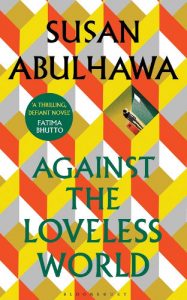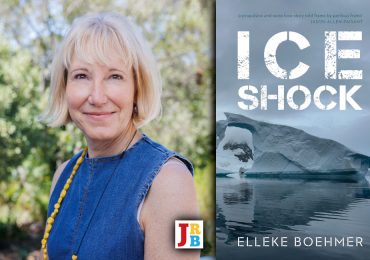Wamuwi Mbao reviews Susan Abulhawa’s Against The Loveless World, winner of the Palestine Book Award.

Against The Loveless World
Susan Abulhawa
Bloomsbury Publishing, 2020
The ongoing crime that is Israel’s presence in the Occupied Territories is part of the heavy freight of the normal that we are constantly being enjoined to return to in Susan Abulhawa’s resistance novel, Against The Loveless World. Here we encounter a work of fiction that calls to us to rethink how the Zionist state’s treatment of Palestinians is meshed to this ‘normal’ that so many are so committed to re-establishing.
Abulhawa is a Palestinian–American writer and activist whose work includes two previous novels of distinctive tone but uneven quality, which centre on Palestinian characters negotiating their way in the world. Fiction is, of course, a deeply receptive form for reimagining life, and its radical changeability is what makes it so suitable for contesting how lives are ordered. In this regard, Abulhawa’s work joins a varied selection of writers of Palestinian origin—among them Zaina Arafat, Hala Alyan and Randa Jarrar—whose nervy, individualistic fiction brings greater legibility to Palestine’s political manifestation by plunging us into the consciousness of people who are normally excluded from the scene.
Told mostly in flashback, Against the Loveless World is the story of Nahr, a Palestinian woman who tells her story while languishing in a cell that derives from the technologies of incarceration and confinement so effectively harnessed by states in the global West intent on throttling resistance. Hers is a fugitive tale that extends back to the post-World War II wresting of Palestine from its inhabitants, moves to her parents’ flight from Palestine in 1967, and ultimately arrives at the destructive, long ever-after of those events.
Born in Kuwait to Palestinian parents whose lives have been knitted by terror and forced migration, Nahr grows up in the kind of tentatively negotiated identity common to the children of the displaced. One of her classmates taunts Nahr by saying ‘Palestinians are stupid. That’s why the Jews stole your country’, and Nahr’s violent retaliation earns her a suspension from school and a reputation as a troublemaker. For the Palestinian children, living in Kuwait is an uneasy fellowship: the sharing of religion does not imply that the imagined boundaries of nationhood won’t exert themselves strongly.
Nahr is an accomplished dancer from a young age:
Women of my generation were born dancing. It was just something we did when we gathered. We’d form a circle, clapping and singing as each of us entered the middle to roll our hips. But I knew early on, by the way people watched me, that the way I danced was enchanting.
One year, she is selected to be part of a troupe of dancers in a televised event to celebrate Kuwait’s Independence Day. But the next year, she is excluded because of complaints that such visibility be reserved for Kuwaiti children only. While her mother bristles at the slight, Nahr remains determined not to see herself as an outsider, attaching herself to her adopted country even as the clamorous invasion and war that will engulf Kuwait at the close of the nineteen-eighties begins to make its coming known. Nahr’s premature marriage to a would-be war hero from the Palestinian homeland is her first inkling that control over her own life, a life in which she imagines her drudgery alleviated by washing machines and dishwashers, will not be so easily attained.
Her world changes dramatically when she meets Um Buraq, a worldly-wise Kuwaiti woman who lures the naïve Nahr into the realm of sex work. Um Buraq is unapologetic about doing all she can to set herself up in an environment that disenfranchises women, and if Nahr is initially repulsed by the ‘older woman’ (because all people older than thirty are geriatric when you’re young and finding yourself), she quickly realises that she has few options for lifting her family out of the doldrums. Nahr’s gathering realisation that sex work gives her a precarious power in a world dominated by men is a crucial development in the novel, although there are several painful lessons that come with it. She forms an odd friendship with Um Buraq, whose advice to her turns out to be sage: ‘Normal isn’t what other people do. You make your own normal.’
In its early stages, this is a novel about the generational effects of displacement, one of that newer crop of books that asks whether the Bildungsroman form, with all its generic rehearsal of human incident, is workable when ‘home’ is a fractured signifier. The overlapping but divergent ways in which Nahr, her mother and her paternal grandmother each imagine their relationship to Palestine tells us so much about how ties are given shape and contour by experience. Nahr’s journey towards love and worldmaking are constantly imperiled by her status as a Palestinian, a condition of being that denies her access to belonging.
The novel exhibits an entangled concern with the role language plays in that belonging. The reader is aware from the first that they are encountering a work rendered for Anglophone sensibilities. Rather than relegating the vexed postcolonial glossary to the back of the book, it sits with granite immovability in the front matter, all twelve pages of it. Seeing how words rub against each other (you’ve probably encountered Za’atar or labneh, which tells you that food is always a place where culture lodges abroad) and how they sit in a text that is implicitly presented as a translation of experience reminds us of how accommodation is also a tool of dislocation.
Against the Loveless World is a taut novel that contends with what it means to refuse the overlapping modes of violence that attach treacherously to the neocolonially dispersed condition of being a citizen whose right of belonging to the world is taken away. Nahr moves through the restrictions of a rigidly policing Islamic patriarchy and finds her identity emerging in the fugitive agency she is able to snatch to herself. In Abulhawa’s deft prose we come to understand Nahr as a female character whose sense of self flourishes in a family defined by its matriarchal strength. As she matures, she learns to flout rules, to be insolent and unapologetic in her curiosity about the world. This stands her in good stead for the many trials she endures, leading to her eventual imprisonment. Her imprisonment is the undergirding fact for much of the novel, but it does not overdetermine the narrative, and that is a credit to the novel.
The novel’s pacing is swift and assured, inviting the sort of page turning that almost seems at odds with the frequently grim subject matter. Perhaps the author’s stylistic sure-footedness slips occasionally—there are one or two clumsy tautologies, as well as needless explanations of food that suggest an editor didn’t peruse the glossary—but overall, the effect is well wrought. This is not a novel from the Imaginary Homelands subset, but in bypassing nostalgia for a more active reckoning with what limits and works against the telling of a story, the novel hooks into something that feels more current.
Where a narrator is positioned in regard to her story matters for reasons of readability, and Nahr’s is a fraught position indeed, characterised by her jaded refusal of the terms which apprehend her before the dwindling audience of journalists, human rights advocates and other storytellers. When an American journalist interviews her at the start of the novel, Nahr evades the woman’s clumsy attempts to place her in a what-when-where narrative of sexual violence and other things that might account for her involvement in ‘terrorism’:
She asked about my prison cell, which she called a nice room, then qualified, ‘But I know it’s still prison.’
‘Are you Jewish?’ I asked.
She made another long blink. ‘I don’t see how that matters.’
‘It matters.’
‘I’m here as a professional, not a religion.’
‘And yet most professionals wouldn’t call this place a nice room,’ I said.
Nahr is a quick-witted storyteller, but she is also somewhat of a vacated interiority for a character upon whom so much of the novel’s detail rests. Trying to tell her story, she says of herself, ‘I want to tell it as storytellers do, with emotional anchors, but I recall emotions in name only. My life returns to me in images, smells, and sounds, but never feelings. I feel nothing.’ That nothingness suffuses the narrative in an unsteadying way, so that one is uncertain just how much readerly investment to place with a character who seems to be happened-to more than she experiences. Abulhawa is better with fleshing out some characters than others. The carelessly vital Um Buraq, who becomes, simultaneously, young Nahr’s pimp and liberator, is drawn in tones of revulsion and fascination that mix compellingly on the page. So too Nahr’s grandmother and mother, each with their own histories of loss and flight behind them, are bracingly natural characters who lend a pleasing sense of the real to the story.
This is a curious novel, one that at times seems too briskly paced where a momentary pausing within a moment would allow for a greater upswell of feeling. But it is rescued by the moments where the prose swirls lyrically around something embodied but inchoate:
Music is like spoken language, inextricable from its culture. If you don’t learn a language early in life, its words will forever come out wrinkled and accented by another world, no matter how well you memorise or love the vocabulary, grammar, and cadences of a new language.
That Against the Loveless World manages to be immersive despite some obvious shortcomings is a statement in favour of the author’s ability to create an inhabitable universe from a throttled subject position. This is not a great novel, but it is a provocative and engaging one.
- Editorial Advisory Panel member Wamuwi Mbao is an essayist, cultural critic and academic at Stellenbosch University. Follow him on Twitter.





